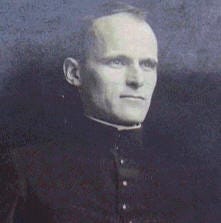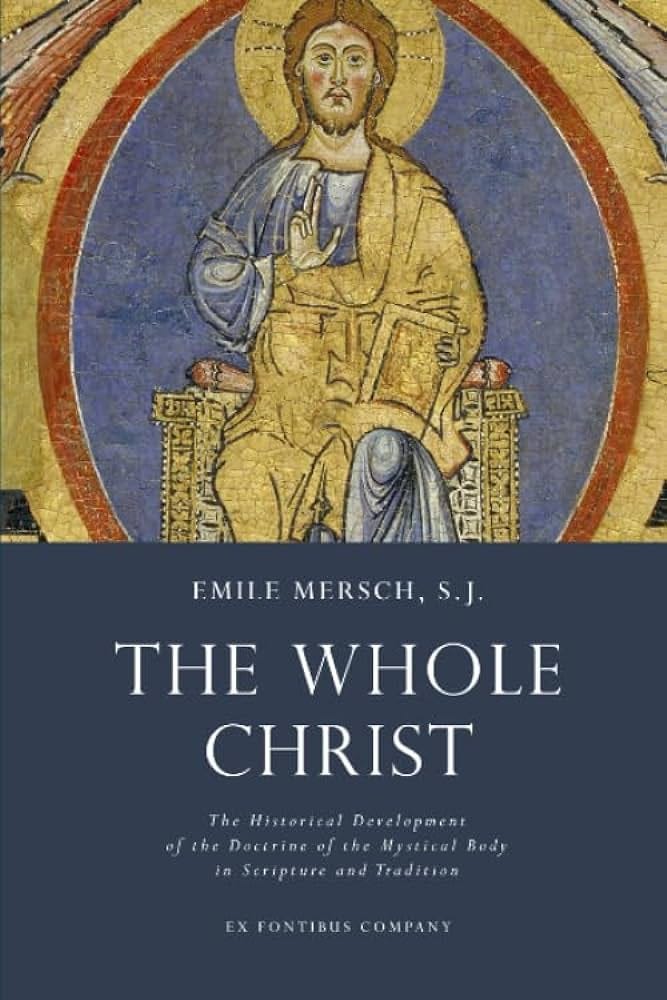St Paul, the Mystical Body and Fr Emile Mersch SJ
This week prolific writer Andrew kuiper gives us a snapshot of a little-known but important figure whose legacy is with us to this day.
For myself, and I suspect for many Catholics whose faith began in the context of low church Evangelicalism, the passages of Paul concerning the church as the body of Christ did not strike me as a great theological mystery. I am not entirely sure if I ever heard the phrase “the mystical body” at any point in my childhood and adolescence. There was a paradoxically inverse relationship between the overwhelming attention given to writings traditionally attributed to Paul and the lack of interest in the mystical, cosmic, ecstatic, and mysterious elements contained within those writings. Why were certain passages of Romans and Galatians made programmatic in a way that the Christological hymn of Colossians never was? Never did I hear a sermon on Colossians 1:24 where Paul claims that he is filling up what is lacking in the sufferings of Christ in his own flesh because the church is the body of Christ. The reading of Scripture is never simply the reading of “Scripture”. So much of what we see in the sacred page is what we allow ourselves to see, consciously or unconsciously.
This is, of course, the hermeneutic condition of all readers and not the exclusive pitfall of low church traditions. Even the hard-nosed scholars of late 19th and early 20th century German higher biblical criticism were unable to see these things in Paul. This was not because their historical training or grammatical prowess was subpar; rather, they could not see the role of mystery and ecstasy in Paul because they found it distasteful and vaguely unethical. And since figures like Rudolf Bultmann, F.C. Baur, and Adolf von Harnack were dedicated to the figure of Paul as the founder of an ethical and a demythologized apocalyptic Christianity, it simply could not be the case that he turned out to have written page after page of ecstatic mystical theology. Albert Schweitzer’s The Mysticism of the Apostle Paul stands as a grand and glorious exception in this strain of scholarship. But even that sad and compassionate soul could not find a way beyond Christian ethics to Christian deification.
What we take for granted in our current catechism—a deep patristic engagement, a sacramental view of art and culture, and a ubiquitous sense of liturgy as mystery—were hard-won victories and by no means the immediate and automatic effect of being a Catholic in the 19th and 20th century.
The shifting of scholarly interest into the contexts of Second Temple Judaism, apocalyptic, merkavah mysticism, Enochian literature, Hellenistic theurgy and apotheosis helped reshape the contours of NT scholarship. Someone interested in a few representative samples of this turn could peruse James Tabor’s Things Unutterable, Adela Yarbro Collins’s Cosmology and Eschatology in Jewish and Christian Apocalypticism, or Alan Segal’s Paul the Convert. The Anglican professor (now emeritus) of biblical exegesis at the University of Oxford, Christopher Rowland, once mentioned the “hidden agenda the aim of which is to produce a portrait of Paul that conforms to rationalist Protestant presuppositions.” This was written not in a salacious blog post or errant tweet, but as a footnote to an essay in a dry and erudite Brill volume entitled The Mystery of God: Early Jewish Mysticism and the New Testament.(409-410) It seems that even scholars have concluded that an intimate familiarity with the letters of Paul do not guarantee that one is not quenching his spirit.
As Catholics, we may be tempted toward a smug triumphalism on this point. Surely there was never a time when our reading of Paul was so devoid of mystery! We must avoid such parochialism and not equate the resources contained within our tradition with what was actually deployed and made use of at any given historical moment. What we take for granted in our current catechism—a deep patristic engagement, a sacramental view of art and culture, and a ubiquitous sense of liturgy as mystery—were hard-won victories and by no means the immediate and automatic effect of being a Catholic in the 19th and 20th century. It is with this struggle in mind, particularly as it relates to the doctrine of the Mystical Body, that I would like to introduce the figure of Emile Mersch S.J.
It is never the case, in Fr. Mersch’s telling, that revelation in Scripture and tradition is clearly delineated and understood at its point of origin.
Born in 1890 to a family of devout Belgian Catholics, Emile Mersch lived and theologized in a period of time which is hard for us to accurately imagine. He came into the world twenty-one years after the opening of the First Vatican Council and died in 1940, twenty-two years before the opening of the Second Vatican Council. His social context was one of extreme political and intellectual turbulence and his chief masterwork, Le Corps Mystique du Christ (hereafter referred to by its English title The Whole Christ) is both a work of historic and dogmatic theology as well a spiritual search. Fr. Mersch entered the novitiate in 1907 and studied at Louvain and Brussels. He was well aware of and interested in the philosophical explorations of transcendental Thomism emerging with Pierre Rousselot and Joseph Marechal. His own work, however, was much more historical and written in a fairly cautious manner. He wrote in a style that seriously attempted to address the concerns of those whose tendencies we might now label “Neoscholastic”. Like the major figures of liturgical reform and ressourcement, he was enthralled with the early church fathers, Latin and Greek. This, however, did not prevent him from expressing equal admiration for the early, middle, and late scholastics—even praising the Baroque Thomism of the School of Salamanca. It is this which should catch our interest: namely, the way he defies easy categorization, never just a historian or simply a retriever of patristics or only a scholastic systematizer, always an admixture of all these categories.
His generous attitude toward all epochs of Catholic theology stems in part from his theology of history. It is never the case, in Fr. Mersch’s telling, that revelation in Scripture and tradition is clearly delineated and understood at its point of origin. It takes time, hundreds or perhaps thousands of years, for what is incipient to grow in the mind of the Church and become more systematic at the hands of her theologians. But this does not mean that the newer and more precise formulations supersede the older adumbrations of the mystery. There must be a continuing dialectic between the original bewildering eruption of the mystery into human language (Scripture), its early vivid treatment (patristics), as well as its delineation and architectonic expansion (Scholasticism). None of these tasks (scriptural exegesis, patristic meditation, and scholastic systemization) can be accomplished in a way that implies termination of the task. Further interventions are always needed.
Fr. Mersch was attempting such an intervention. He sensed that the full import of the doctrine of the Mystical Body was in danger of being side-lined. This would constitute a disaster. For Fr. Mersch, this doctrine was “both the centre of resistance against error and the heart of the Church’s positive teaching” (577). He was pleased that Vatican I had begun with a full-throated endorsement of the Mystical Body in its original draft of the treatise on the Church De schema de ecclesia Christi (eventually transformed into Pastor aeternus). However, he was disturbed that, after it was distributed among those assembled for Vatican I, this ancient and traditional phrase actually received objection from some of the council fathers (though this complaint was a minority). There was a concern among some theologians that such language should not be used in conciliar documents because it was too “vague”. The task that Fr. Mersch attempts in The Whole Christ is one of defending the sometimes “vague” descriptions of the Mystical Body in Scripture since the “prime duty of one who would record another’s thought, or even his own thought, is not to be clear, but to be faithful and true to the model”(11). As Fr. Mersch points out, the writings of Pelagius on soteriology are far clearer than Augustine’s. Does that make them truer? One major premise underlying the whole project of The Whole Christ is a rejection of the epistemological demand that everything that is true must also be “clear and distinct”. In other words, it is a defense of mystery as a form of knowing which both exceeds understanding while being the horizon for making further progress possible.
At the same time that Fr. Mersch defends a supernatural superabundance beyond reason, he is also keen to demonstrate that the doctrine of the Mystical Body can allow for precise reasoning and provide for concrete applications. The very structure of his masterwork follows a historical pattern because he intuits that,
“there is a logical order corresponding to this historical order, and that the ideas which are differently expressed in different ages are intrinsically connected with each other” (14).
Most fundamentally, and with particular reference to Paul, Fr. Mersch defines the Mystical Body as the being of humanity which is esse in Christo, a supernatural ontology! Our destiny was not simply to exist as separate created beings according to our finite nature (the infamous “natural end” of some Scholastic paradigms) but always as creatures called to incorporation into the divine nature through Christ. The unity we have with Christ as we are being deified is, in fact, the Mystical Body. And following Romans 8, Fr. Mersch does not hesitate to say that this Mystical Body includes both humanity and all the rest of creation: “Just as in God there is a pre-existence of Christ in relation to the Incarnation and creation, so there is in Christ a pre-existence of the Mystical Body in relation to all things that are created: the two are inseparable” (24).
The Whole Christ dedicates studies to the Gospels, Johannine and Pauline epistles, Latin and Greek fathers, early, middle, and late Scholasticism, as well as the French Berullian school. Yet it is with his view of Paul that I want to conclude. Without the benefit of more recent studies of late antiquity, Second Temple Judaism, or apocalyptic, Fr. Mersch managed to read more of what was there than many of his contemporaries by arming himself with insights from the past. He pulls from the early modern Jesuit exegete Cornelius à Lapide in ascribing to Paul:
“an ecstatic love…a love that snatches and carries Paul out of himself” (87)
He quotes Bossuet saying that whoever would wish to delete the passages in Paul concerning the Mystical Body would “suppress the greater part of his divine Epistles.” At around the same time that his fellow Jesuit, Teilhard de Chardin, is writing The Divine Milieu, Mersch is gleaning from Paul that “Christ is action, Christ is the force that raises the world to higher things” (109) and that “The Church continues Christ” (121). Even more forcefully, he discerns in Paul’s continuous chanting of ἐν Χριστῷ (in Christ) the truth that Christ’s actions are only finally consummated in the actions of Christians and that “the Church is the continuation, the fulness, the pleroma, of the Saviour” (131).
Finally, and most crucially, Fr. Mersch saw the doctrine of the Mystical Body as a historical reality which should inform our social and political lives. The unity of the human race and its deification in Christ is not a private opinion or an individual reality. The ecclesial form of deification makes it public, and its mystical character demands that this natural/supernatural society only grows according to the rule of freedom and love. We have only been gathered together by Christ’s death and resurrection. And like a living stone, both the lapisque angularis, qui facis utraque unum and the lapis philosophorum, “He has begun in Himself the divine alchemy that is to transform the whole race of men” (125).
Andrew Kuiper is an independent writer based in southern Michigan with his wife and three children. His interests are primarily in theology and philosophy and he usually writes about Greek mythology, Neoplatonism, Jewish mysticism (particularly Kabbalah) and its Christian reception, German Idealism and Romanticism, Catholic Ressourcement, and Russian Sophiology. He recently contributed to a volume on the Catholic philosopher William Desmond and the possible application of his work in biblical exegesis. He has written for The Lamp Magazine, Church Life Journal and Ex Fontibus amongst others.
If you want to find out more about mystery theology, Bishop Hugh Gilbert of the Diocese of Aberdeen, wrote a piece about Dom Odo Cassel who, like Fr Emilie Mersch SJ saw mystery at the heart of Christianity - as Bishop Hugh said:
And the Mystery, in the predominantly Pauline sense, "means, first of all, a deed of God's, the working-out of an eternal divine plan through an act which proceeds from His eternity, is realized in time and the world, and returns once more to Him, its goal in eternity."
If you want to find out more click here to go to the article.
This month has already seen St Columba and St Ternan but for us here at the Coracle there are none more important than St Moluag whose feast day is the 25th June.





